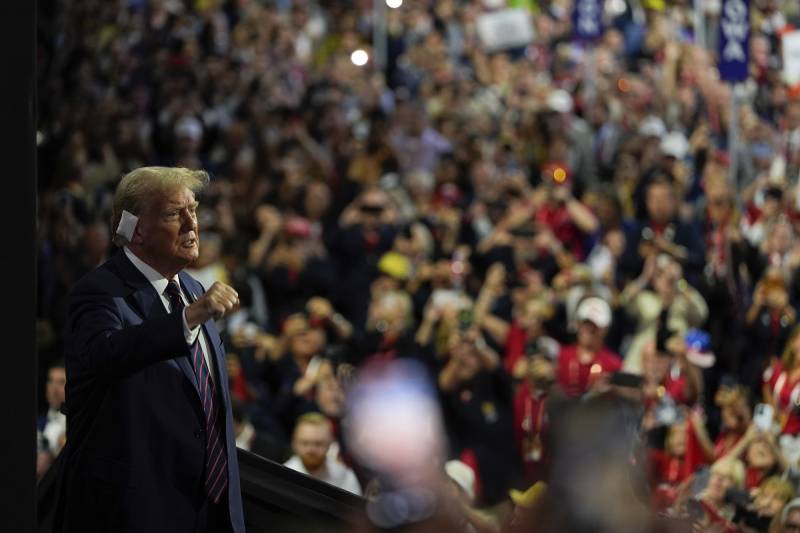Trump told the Washington Examiner he was going to give a “humdinger” of a speech attacking President Joe Biden — until the shooting.
“Honestly,” he said, “it’s going to be a whole different speech now.”
Whether Trump — whose inaugural address in 2017 ignored the tradition of giving inspirational, unifying speeches — is able to resist the temptation to attack Democrats will be among the biggest questions answered on Thursday.
2. Preview of attacking Kamala Harris at the top of the ticket?
The chances of Biden being replaced on the ticket increased with Wednesday’s COVID-19 diagnosis and the mounting discontent from fellow Democrats, who are terrified that he will lead them to political ruin up and down the ballot.
With Vice President Kamala Harris a likely replacement, Republicans, including Trump, have been ratcheting up criticisms of her. One common refrain now is that she participated in “gaslighting” the American people by vouching for Biden’s mental acuity when she must have known better.
They also refer to her as Biden’s “border czar,” an attempt to tie her to the at-times overwhelming flow of migrants seeking asylum. (That was never her portfolio, although the president asked her to visit Central American countries to try to improve the underlying conditions that have led so many residents to make the treacherous journey north.)
Look for how much time Trump spends on Harris versus Biden on Thursday night.
One other thing: How will the former president pronounce Harris’ first name? Republicans can’t seem to say it correctly, consistently misplacing the emphasis on the second syllable (kah-MA-luh vs. KAH-muh-luh).
It’s a clear sign of disrespect and a crude way of calling attention to her name, which means “lotus” in Sanskrit, a nod to her Indian American mother. Deliberately mangling her name is clearly part of an effort to make her seem “un-American,” a tactic similar to one employed by Trump against President Barack Obama.
3. How much time will Trump devote to the virtues of Sen. J.D. Vance?
Trump is famously focused on himself, asserting a conveyor belt of superlatives about every aspect of life, from his business ventures to his personal health and his golf game. He chose Vance, so obviously, he thinks Ohio’s junior senator can help him win. But will he spend more time talking about Vance’s virtues or his own brilliance in making the pick?
When Vance sat in the president’s box on Monday night, there was very little visible chemistry between them. When their families come out on stage after Trump speaks — assuming Vance is afforded that opportunity — will they seem like a genuine team or just two guys running together on the same ticket?
4. How will he frame crime, immigration and border security?
In the past, Trump has used extremely harsh language describing people who cross the border to seek asylum or sneak across without proper documents. After becoming president in 2017, he immediately issued a ban on entry from several Muslim-majority countries before the courts struck it down.
He blames “illegal aliens” for taking jobs from U.S. citizens and committing heinous crimes, even saying in December that they’re “poisoning the blood of our country.”
At this convention, Republicans have tried to center people of color and immigrant families in an apparent effort to soften the harsh edges of the GOP created by Trump’s rhetoric. But many on the arena floor waved signs reading “Mass deportations now!”
Will Trump tone that down Thursday night, or just continue with more of the same?
5. Will the word abortion pass his lips?
Past Republican platforms have used extreme language to describe abortion and declare the rights of unborn children.
Trump, recognizing the political liability of such positions, successfully shortened and toned down the abortion issue, removing calls for a national ban on abortions and inserting a “let the states decide” position, as well as adding support for IVF treatments and opposition to late-term abortions, which are exceedingly rare.
Over the course of his life, Trump has gone from supporting abortion rights to promising to appoint Supreme Court justices that would overturn the Roe v. Wade decision granting the nationwide right to an abortion to now saying he opposes a national ban of any kind.
His base largely accepted this watered-down stance, but it will be interesting to see how much time he devotes to the issue or whether he mentions it at all.
6. Still a dictator on day one?
In an interview with Fox News a few months ago, host Sean Hannity asked Trump whether, as his critics alleged, Trump would be a dictator if he regained the White House. He responded that he would not be a dictator, except on his first day in office.
“I want to close the border, and I want to drill, drill, drill,” Trump said. “Other than that, I am not a dictator.”
Democrats pounced on that comment, saying it was proof that Trump had authoritarian instincts and could not be trusted to return to 1600 Pennsylvania Ave.
Those allegations have been underscored by Project 2025, the 900-plus page manifesto issued by the conservative Heritage Foundation and written by many former Trump staffers and allies. It calls for specific steps the former president could take upon returning to power, from mass deportations of undocumented immigrants to undoing climate change and green energy initiatives and politicizing the Department of Justice to go after political enemies.
